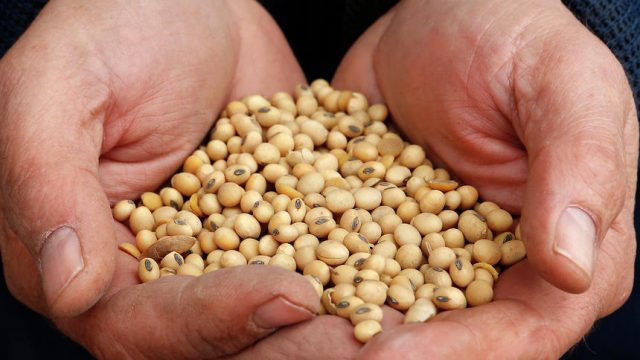Soybeans Are Going to Be a Real Problem for Republican Candidates Cramer and Armstrong

Mike Dahlen holds a sample of soybeans from his Northwood, ND, farm. photo by Eric Hylden/Grand Forks Herald
“Elevators in the eastern portion of the state have pulled their bids for soybeans,” Dr. Frayne Olson, a crop economics expert from North Dakota State University, tells the Williston Herald. “There is literally no price for soybeans.”
Right now Olson said there is only a small number of elevators in our region where this is a problem, but that he expects the problem to grow.
If he’s right, this is a real political problem for Republicans. Particularly the two Republicans running for Congress this cycle: U.S. House candidate Kelly Armstrong and Senate candidate Kevin Cramer.
For months now Democrats have invested themselves heavily in messaging critical of the Trump administration’s trade policies and the collateral damage they’ve caused to American businesses. Particularly in the agriculture industry.
While it’s fair to say that much of that rhetoric has been hyperbole, there has been always been an element of truth to it as well.
[mks_pullquote align=”left” width=”300″ size=”24″ bg_color=”#ffffff” txt_color=”#000000″]Privately I’ve had Republicans working on these campaigns tell me that if some of this uncertainty for agriculture isn’t cleared up – and by that they meant both the trade issues and the lingering debate over the farm bill – they’re going to have problems.[/mks_pullquote]
Republicans, meanwhile, have been forced into a balancing act where they express concern about the side effects of Trump’s approach to trade while simultaneously expressing support for his overarching goals. That’s been their public messaging, anyway.
Privately I’ve had Republicans working on these campaigns tell me that if some of this uncertainty for agriculture isn’t cleared up – and by that they meant both the trade issues and the lingering debate over the farm bill – they’re going to have problems.
It seems, based on these reports about soybeans, the problems have arrived.
But how will that impact voting trends?
On one hand, voters are very much influenced by recency bias. Republicans can argue that short term turbulence in the commodities markets is the price of admission to making real progress toward better trade deals, but that probably comes as cold comfort to farmers staring down the barrel of real financial losses in the here and now.
On the other hand even Democrats acknowledge that the impetus for Trump kicking off this trade war – the idea that America has received the short end of the stick from trade partners like China – is real. And when asked what they’d do differently to solve the problem they admit is real they start running down a litany of approaches which have all been tried in the past.
Trump supporters – and there may be no other place in the country where Trump has more political support than North Dakota – voted for him because they wanted a new approach to persistent problems like trade and immigration. If those voters in North Dakota can keep the faith, even while some of them take a hit to the bank account, it will go well for Republicans.
If Democrats can successfully convince voters to pay attention to short term pain, instead of the possibilities of long term gains, it will go well for them.
Based on all of the publicly available polling data we have Armstrong has a commanding lead over Democrat Mac Schneider in the House race. This issue, even if it hurts him, probably won’t turn the election.
In the Senate race, while it’s clear that Cramer has the momentum in this moment, this issue could turn on him very quickly and throw victory to incumbent Senator Heidi Heitkamp.




